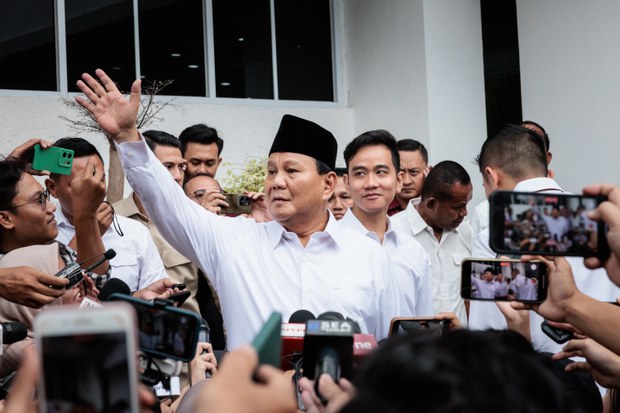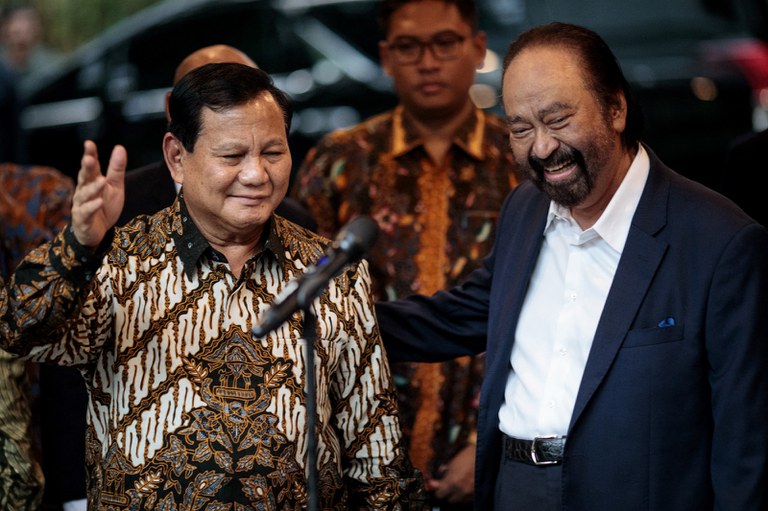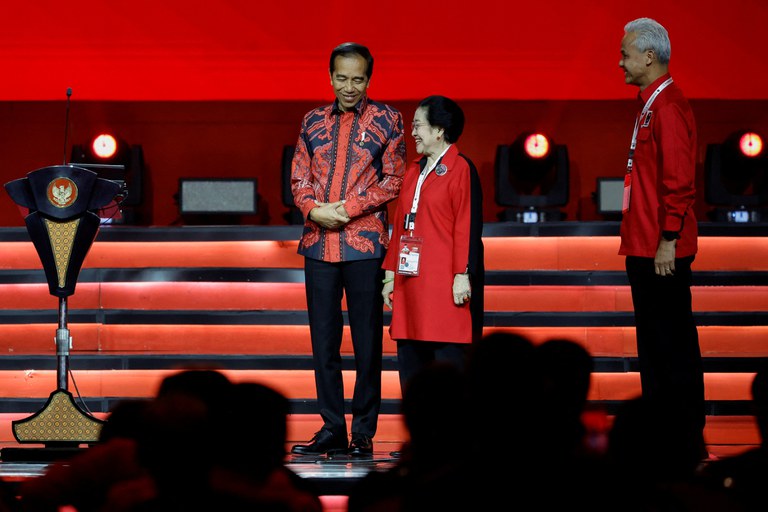As Indonesian President-elect Prabowo nears parliamentary majority, experts fear democracy will suffer
2024.05.02
Jakarta
 Indonesia’s Defense Minister and President-elect Prabowo Subianto (left) and Vice President-elect Gibran Rakabuming Raka speak to the media after a meeting of the General Elections Commission (KPU) announcing the 2024 presidential election at its office in Jakarta, April 24, 2024.
Indonesia’s Defense Minister and President-elect Prabowo Subianto (left) and Vice President-elect Gibran Rakabuming Raka speak to the media after a meeting of the General Elections Commission (KPU) announcing the 2024 presidential election at its office in Jakarta, April 24, 2024.
As rival parties align with President-elect Prabowo Subianto, it appears Indonesia will have a stable government when he takes office in October, but analysts warn that the lack of a viable parliamentary opposition may harm this young democracy.
Two major parties, the National Awakening Party (PKB) and NasDem Party, backed Prabowo’s rivals in the Feb. 14 election, but both have now endorsed him. If they join his coalition, the president-elect will command a 71% majority in the House of Representatives (DPR).
Idil Akbar, a political analyst at Padjadjaran University in Bandung, believes there can be no democracy without an effective opposition.
“Without political parties that can genuinely provide a counterpoint to the Prabowo administration, democracy’s essential equilibrium is at risk,” he told BenarNews.
“It’s challenging to remain optimistic about the future when all political parties are in support of the government.”
As it is, human rights groups say Indonesian democracy slid back during the two terms of outgoing President Joko “Jokowi” Widodo, when a majority of lawmakers in the House supported him. Activists cite a decline in free speech, rampant restrictions on civil liberties, and police surveillance.
During Jokowi’s administration, the lack of a strong opposition allowed for the passage of controversial bills such as the criminal code, the job creation law and the KPK law.

Meanwhile, if two more parties, the Prosperous Justice Party (PKS) and the United Development Party (PPP), also join Prabowo as they have indicated, he could have an even larger majority in the legislature.
Like NasDem and PKB, which backed opposition candidate Anies Baswedan for president in the election but are now supporting Prabowo’s keadership, the Muslim-oriented PKS and PPP also endorsed Anies and third-place candidate Ganjar Pranowo, respectively.
This would leave the current ruling party, the Indonesian Democratic Party of Struggle (PDI-P), as the only opposition – that is, if it decides it won’t join the Prabowo bandwagon.
PDI-P won the most seats in the Feb. 14 legislative election, and controls 16.7% of the DPR. It has hinted it wants to play the role of opposition.
The party no longer has the support of now-former member Jokowi who tacitly backed Prabowo’s presidential ticket, instead of PDI-P candidate Ganjar.
Jokowi’s move was seen as an attempt to maintain political influence and ensure his policies continue after he steps down in October due to term limits. That his eldest son, Gibran Rakabuming Raka, was chosen by Prabowo as his vice presidential nominee made Jokowi’s intentions even more clear.
Cyril Raoul Hakim, a spokesperson for the party, said it would follow due process before officially announcing whether it would stay in the opposition or join Prabowo’s coalition. But the PDI-P leadership does know what the party rank-and-file want to do.
“The prevailing sentiment among our base – from local branches to the national leadership –is to remain outside the government. Nonetheless, we must follow due process before announcing an official position,” he told BenarNews.
Even if the PDI-P were to remain in the opposition, analysts worry it won’t be very effective because Prabowo would have a big majority in the House of Representatives with just the potential support of NasDem and PKB.

PKB chair Muhaimin Iskandar, who voiced his party’s commitment to collaborate with the Prabowo administration, has a complicated history with the president-elect.
Before he ran for vice president with Prabowo rival Anies in the election, he and his party had allied with Prabowo’s Gerindra party. The move to back Gerindra was to promote a possible Prabowo-Muhaimin pairing, but when that did not work out he decided to back Anies.
Still, Muhaimin said, “there is a history of fruitful cooperation between PKB and Gerindra across both legislative and executive branches, and we are keen to strengthen this alliance.”
The partnership aims to address “the developmental challenges that lie ahead for the nation,” he said.
NasDem chairman Surya Paloh conveyed the party’s endorsement after a visit to Prabowo’s home late last month.
“Our optimism about Indonesia’s future is the driving force behind our full support for President Prabowo and Vice-President Gibran,” he said.
Signaling a realignment of political forces, PKS, which previously backed Prabowo in the 2014 and 2019 presidential contests, has hinted at pivoting from its opposition role, which it has been in for 10 years.
Aboe Bakar Alhabsyi, PKS’s secretary general, recently relayed the party’s intention to play an active role in the nation’s trajectory.
“We aim to contribute constructively to the nation’s future, optimizing the potential of our party members who are ready to serve with positivity and professionalism,” he said at a party gathering.
Sandiaga Uno, a member of PPP and one of Indonesia’s richest men, has said the party should extend its support to Prabowo.
‘Democracy is rife with paradoxes’
Majority support could lead to the emergence of what political analyst Wasisto Raharjo Jati calls “a political cartel” that would shut out alternative voices in the House.
Additionally, Prabowo runs the risk of leading a bloated government, because the parties that supported him would likely want at least one of their lawmakers in a ministerial position, Wasisto told BenarNews.
“A large coalition guarantees stability in the executive and legislative branches, facilitating smooth policy formulation and budget approval,” he said.
“Yet, as the coalition expands, so too does the size of the government. This expansion could potentially lead to a more cumbersome governmental process due to the increased complexity of the decision-making chains,” Wasisto said.
On Prabowo’s part, he has invited all national elements to participate, in an inclusive approach that mirrors Jokowi’s strategy, said Kacung Marijan, an analyst from Airlangga University in Surabaya.
Prabowo himself ran for president against Jokowi twice – 2014 and 2019 – and lost both times. But after his win in 2019, Jokowi invited Prabowo to be in his cabinet as defense minister. Prabowo accepted.
“Democracy is rife with paradoxes, balancing between conflict and consensus,” Kacung told BenarNews.
“Without conflict, consensus alone cannot sustain checks and balances, nor can it foster the presence of dissenting voices essential for democratic discourse.”







